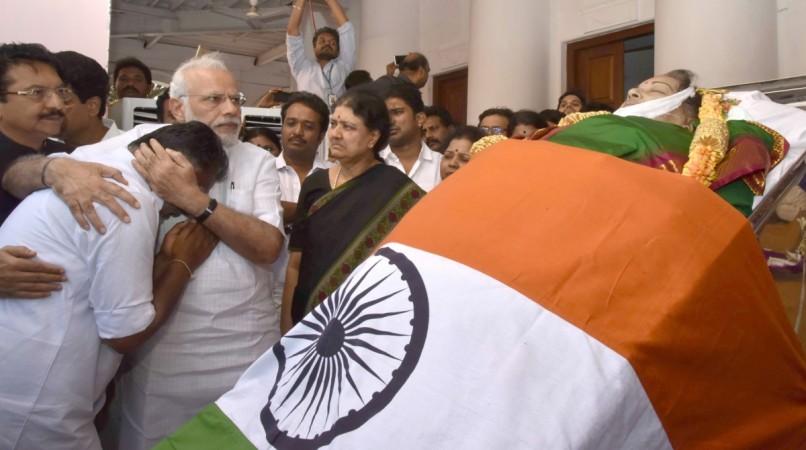
Pictures of a sobbing O. Panneerselvam being hugged by a visibly moved Narendra Modi near Jayalalithaa's dead body were enough to show the grief that her untimely death brought to people associated with her. The new Tamil Nadu chief minister also had to wipe away tears when he was sworn in to replace the deceased leader early morning on December 6.
That he could not keep his emotions corked up, of course, spoke volumes about the loss he felt. It also proved once again that the Indian public is willing, in a maturely indifferent way, to accept its leaders as mere humans, allowed to have weak moments. Even in a state like Tamil Nadu, where politicians are revered as larger-than-life personalities, a politician — that too a man — crying in public did not make him any less a leader in the eyes of followers. Rather, it may have only risen his stature in their eyes, as an empathetic, sensitive person they could relate to, and not a detached, cold leader who perfunctorily waves at crowds from a jeep.
But then Indians have largely been kind to seeing their political idols break down in open. Uttar Pradesh Chief Minister Akhilesh Yadav's tears came to good use to mend ties with his family. Amid the turmoil in their Samajwadi Party, that began after the young scion sacked his uncle Shivpal Yadav in October, became an open feud fought in public, Akhilesh broke down during a party meeting in Lucknow. At the event convened by his father, SP chief Mulayam Singh Yadav, the 43-year-old Uttar Pradesh chief minister said in a heavy voice, "Let netaji (Mulayam) install a chief minister who he feels is honest," and added, "Why should I form a new party? Merey pita, merey guru hain (my father is my guru)."

His outburst was not seen as a sign of weakness by most of his followers, and Akhilesh came out of the dispute unscathed, his image getting a rather macho boost as a young man trying his best to stand up to family elders' bullying diktats.
While Akhilesh gained sympathy from the Uttar Pradesh citizens, Modi swept a much larger audience with his tears more than once. The prime minister got carried away while he was addressing a gathering in Goa on November 13. In a voice choked with emotion, he pleaded with people to give him 50 days for the effects of demonetisation to be visible.
This was not the first time Modi put up his feelings on display. And got away without being called a weakling. The prime minister broke down in front of his Bharatiya Janata Party colleagues in May 2014 when he was unanimously chosen as the leader of the BJP parliamentary party. A year later, he lost his reserve in front of a much bigger crowd.

When he spoke with a lump in his throat during the Q&A session with Facebook CEO Mark Zuckerberg at Silicon Valley last year, the Indian prime minister's show of his human side was seen as a mark of his inspiring personality. Recalling the struggles his mother faced when he was a child, a tearful Modi said with tremor in his speech, "I came from a very poor family. When we were young, what we did to get by ... she went to our neighbors' houses nearby [to] clean dishes, fill water, do hard chores. So you can imagine what a mother had to do to raise her children."
While Modi's fans fawned over the leader, held by many to be the cold-hearted mastermind of the Gujarat riots, perhaps the only one who openly objected to his show of vulnerability was the Congress. Party leader Anand Sharma called Modi's claim that his mother used to wash utensils a lie. "He is insulting his own mother," Sharma said. On the other hand, Zuckerberg, the man who watched the moment most up close, labelled Modi's words as "deeply moving and inspiring". He posted the video on Facebook on September 27, 2015, saying, "The most amazing moment this morning was when Prime Minister Narendra Modi and I talked about our families, and he shared stories of his childhood and the impact his mother had on his life. His answer is deeply moving and inspiring, and it's worth watching all the way through."
Zuckerberg's video got 322,000 likes on Facebook. Proof enough perhaps that Indian leaders can cry, and not be called crybabies.








